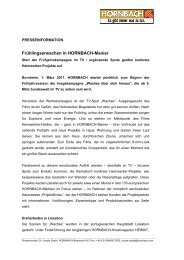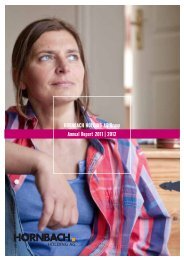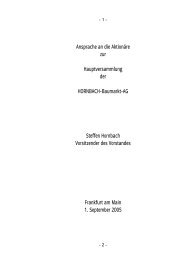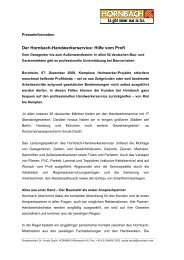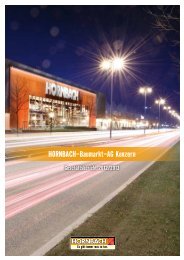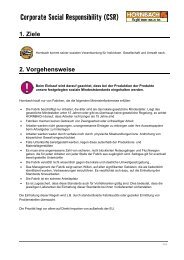Hornbach-Baumarkt-AG Group
PDF, 3,6 MB - Hornbach Holding AG
PDF, 3,6 MB - Hornbach Holding AG
- No tags were found...
Create successful ePaper yourself
Turn your PDF publications into a flip-book with our unique Google optimized e-Paper software.
GROUP MAN<strong>AG</strong>EMENT REPORT Macroeconomic Framework 37<br />
Alongside declining demand from outside Europe, the poor<br />
performance of the European economy in the course of 2012<br />
chiefly resulted from home-made problems in the euro area.<br />
Consumer, business and investor confidence all clearly took a<br />
knock from the intensification in the crisis in the summer of<br />
2012, as is apparent in, among other sources, the sentiment<br />
indicators calculated by the European Commission. Both<br />
consumer confidence and the business confidence index<br />
plummeted from the spring through to the fall of 2012. Consistent<br />
with this picture was the weak level of domestic demand,<br />
the primary cause of the recession. Gross fixed capital<br />
formation fell sharply in the euro area, reducing by a quarterly<br />
average of around four percent compared with the respective<br />
previous year’s period. In particular, this reflected a sharp<br />
drop in output by more than five percent in the European<br />
construction industry. In terms of the countries where HORN-<br />
BACH operates, the downturn in construction output was<br />
especially severe in the Czech Republic (minus 6.6%), the<br />
Netherlands (minus 8.6%) and Slovakia (minus 12.3%). This<br />
was the result not only of restrictions on housing construction<br />
activity and uncertainties surrounding fiscal support for real<br />
estate, but also of reductions in public and commercial construction<br />
investments.<br />
Not only that, given rising state duties, shrinking real-term<br />
incomes, rapidly rising unemployment, and a widespread<br />
feeling of uncertainty, private households remained unwilling<br />
to spend. Private consumer spending contracted by more than<br />
one percent within the twelve-month period. Accordingly, realterm<br />
retail sales fell by 0.9% in the European Union and even<br />
by 1.8% in the euro area in 2012. Five of the nine countries in<br />
HORNBACH’s store network – Germany, the Netherlands,<br />
Austria, the Czech Republic, and Slovakia – witnessed a<br />
contraction in real-term retail sales. The Eurostat figures<br />
show positive growth rates for Luxembourg, Romania, Sweden,<br />
and Switzerland. Indicators available from trade association<br />
surveys show that in most European countries demand levels<br />
in the DIY store and garden center sector, i.e. in the DIY retail<br />
sector, fared less favorably in 2012 than in the overall retail<br />
sector.<br />
German economy proves resilient<br />
The German economy successfully held the European recession<br />
at bay for large parts of 2012 and notwithstanding difficult<br />
macroeconomic omens managed to post moderate growth.<br />
According to figures released by the Federal Statistical Office<br />
(Destatis), real-term gross domestic product was 0.7% higher<br />
than in the previous year (calendar-adjusted: 0.9%). However,<br />
Europe’s largest economy ran out of steam towards the end of<br />
2012. Fourth-quarter real-term GDP adjusted for seasonal and<br />
calendar factors shrank by 0.6% compared with the previous<br />
quarter. Despite generating positive growth in each of the first<br />
three quarters of 2012, the German economy consistently lost<br />
momentum.<br />
The key factors influencing domestic demand, and thus the<br />
most important means of assessing the underlying framework<br />
for German DIY stores and garden centers, as well as for the<br />
builders’ merchant business, showed disparate developments<br />
in 2012. According to the harmonized consumer price index<br />
(HCPI), the annual inflation rate rose by 2.1%. As real-term<br />
incomes rose faster than inflation in 2012, as had also been<br />
the case in the two previous years, private households had<br />
increasing spending power. Adjusted for inflation, private<br />
consumer spending grew by 0.6%. Consumers were thus a<br />
source of only modest momentum. GfK consumer surveys<br />
nevertheless pointed to consistently positive consumer confidence.<br />
This was chiefly due to the robust situation on the<br />
labor market and substantial income growth. On the other<br />
hand, capital expenditure in Germany in 2012 fell notably<br />
short of the figure for the previous year. That applied not only<br />
to investments in equipment (down by 4.8% in real terms),<br />
but also to construction investments. Following strong priceadjusted<br />
growth of 5.8% in the previous year, these then<br />
contracted by 1.5% in 2012. Overall, construction activity in<br />
Germany showed a divided picture. In real terms, housing<br />
construction investments grew year-on-year by 1.5% in 2012,<br />
while non-housing construction fell by almost five percent.



